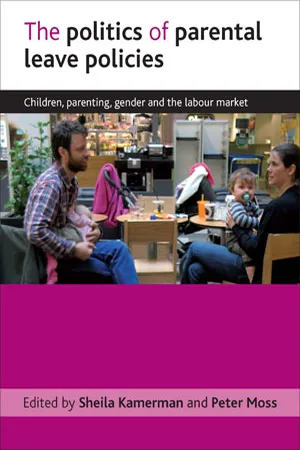
- 296 pages
- English
- PDF
- Available on iOS & Android
About this book
With the growth of parental employment, leave policy is at the centre of welfare state development and at the heart of countries' child and family policies. It is widely recognised as an essential element for attaining important demographic, social and economic goals and is the point where many different policy areas intersect: child well-being, family, gender equality, employment and labour markets, and demography. Leave policy, therefore, gives a unique insight into a country's values, interests and priorities. International comparisons of leave policy are widely available, but far less attention has been paid to understanding the factors that bring about these variations. The politics of parental leave policies makes good this omission. Looking at parental leave policy within a wider work/family context, it addresses how and why, and by whom, particular policies are created and subsequently developed in particular countries. Chapters covering 15 countries in Europe and beyond and the European Union bring together leading academic experts to provide a unique insight into the past, present and future state of this key policy area. The politics of parental leave policies is essential reading for students, teachers and researchers in social policy, child and family policy, welfare states, gender relations and equality, and employment and labour markets, providing an opportunity to study in depth the creation of social policy. It will also be of interest to policy makers in national governments and international organisations.
Frequently asked questions
- Essential is ideal for learners and professionals who enjoy exploring a wide range of subjects. Access the Essential Library with 800,000+ trusted titles and best-sellers across business, personal growth, and the humanities. Includes unlimited reading time and Standard Read Aloud voice.
- Complete: Perfect for advanced learners and researchers needing full, unrestricted access. Unlock 1.4M+ books across hundreds of subjects, including academic and specialized titles. The Complete Plan also includes advanced features like Premium Read Aloud and Research Assistant.
Please note we cannot support devices running on iOS 13 and Android 7 or earlier. Learn more about using the app.
Information
Table of contents
- The politics of parental leave policies